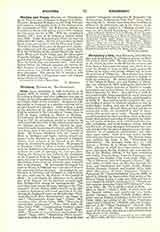

Nider, JOHN, theologian, b. 1380 in Swabia; d. August 13, 1438, at Colmar. He entered the Order of Preachers at Colmar and after profession was sent to Vienna for his philosophical studies, which he finished at Cologne where he was ordained. He gained a wide reputation in Germany as a preacher and was active at the Council of Constance. After making a study of the convents of his order of strict observance in Italy he returned to the University of Vienna where in 1425 he began teaching as Master of Theology. Elected prior of the Dominican convent at Nuremberg in 1427, he successively served as socius to his master general and vicar of the reformed convents of the German province. In this capacity he maintained his early reputation of reformer and in 1431 he was chosen prior of the convent of strict observance at Basle. He became identified with the Council of Basle as theologian and legate, making several embassies to the Hussites at the command of Cardinal Julian. Sent as legate of the Council to the Bohemians he succeeded in pacifying them. He journeyed to Ratisbon (1434) to effect a further reconciliation with the Bohemians and then proceeded to Vienna to continue his work of reforming the convents there. During the discussion that followed the dissolution of the Council of Basle by Eugene IV, he joined the party in favor of continuing the Council in Germany, abandoning them, however, when the pope remained firm in his decision. He resumed his theological lectures at Vienna in 1436 and was twice elected dean of the university before his death. As reformer he was foremost in Germany and welcomed as such both by his own order and by the Fathers of the Council of Basle. As a theologian his adherence to the principles of St. Thomas and his practical methods made him distinguished among his contemporaries. The most important among his many writings is the “Formicarius” (5 vols., Douai, 1602) a treatise on the philosophical, theological, and social questions of his day. Among his theological works are the following: “Commentarius in IV libros Sententiarum” (no longer extant); “Praeceptorum divine legis” (Douai, 1612, seventeen other editions before 1500); “Tractatus de contractibus mercatorum” (Paris, 1514, eight editions before 1500); “Consolatorium timoratae conscientiae” (Rome, 1604); “De Morali lepra” (Regia, 1830); “Manuale ad instructionem spiritualium Pastorum” (Rome, 1513); “Alphabetum Divini Amoris” (Antwerp, 1705, in works of Gerson); “De modo benevivendi” (commonly attributed to St. Bernard); “De Reformatione Religiosorum Libri Tres” (Paris, 1512; Antwerp, 1611). Besides these there are several letters written to the Bohemians and to the Fathers of the Council of Basle, printed in “Monum. Concil. General., saec. XV, Concil. Basil. Scrip.”, I (Vienna, 1857).
IGNATIUS SMITH

